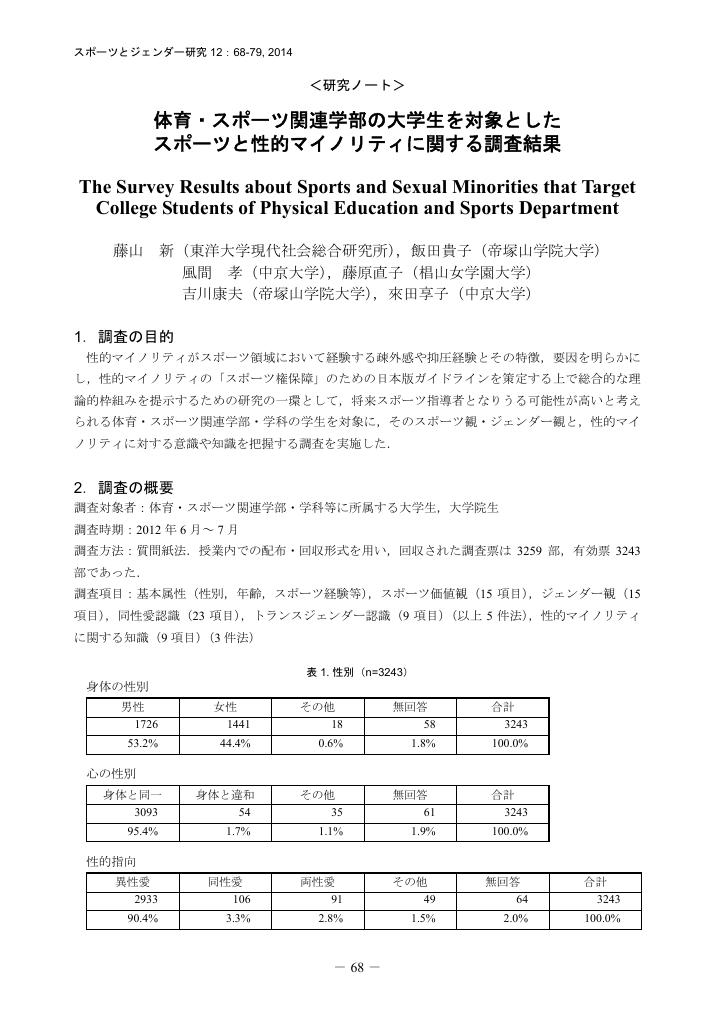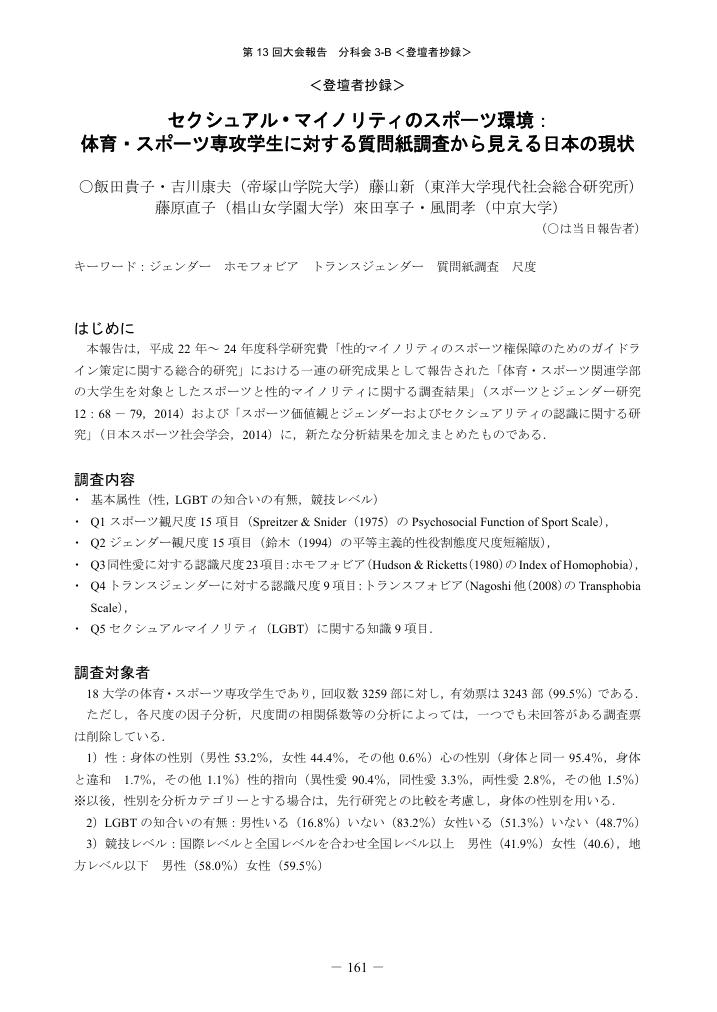- 著者
- 杉山 文野 井谷 聡子 藤山 新
- 出版者
- 日本スポーツとジェンダー研究会
- 雑誌
- スポーツとジェンダー研究 (ISSN:13482157)
- 巻号頁・発行日
- vol.10, pp.45-48, 2012-03-20
4 0 0 0 OA 体育・スポーツ関連学部の大学生を対象としたスポーツと性的マイノリティに関する調査結果
- 著者
- 藤山 新 飯田 貴子 風間 孝 藤原 直子 吉川 康夫 來田 享子
- 出版者
- 日本スポーツとジェンダー学会
- 雑誌
- スポーツとジェンダー研究 (ISSN:13482157)
- 巻号頁・発行日
- vol.12, pp.68-79, 2014 (Released:2017-04-28)
- 参考文献数
- 12
- 被引用文献数
- 8
- 著者
- 藤山 新 飯田 貴子 吉川 康夫 井谷 聡子 風間 孝 來田 享子 佐野 信子 藤原 直子 松田 恵示
- 出版者
- 日本スポーツとジェンダー学会
- 雑誌
- スポーツとジェンダー研究 (ISSN:13482157)
- 巻号頁・発行日
- vol.8, pp.63-70, 2010 (Released:2021-01-01)
- 参考文献数
- 7
3 0 0 0 OA セクシュアル• マイノリティのスポーツ環境
- 著者
- 飯田 貴子 吉川 康夫 藤山 新 藤原 直子 來田 享子 風間 孝
- 出版者
- 日本スポーツとジェンダー学会
- 雑誌
- スポーツとジェンダー研究 (ISSN:13482157)
- 巻号頁・発行日
- vol.13, pp.161-163, 2015 (Released:2017-04-14)
1 0 0 0 OA スポーツにおける「対等」なジェンダー関係のために 競艇に見る「スポーツ」と「ジェンダー」
- 著者
- 藤山 新
- 出版者
- 日本スポーツとジェンダー学会
- 雑誌
- スポーツとジェンダー研究 (ISSN:13482157)
- 巻号頁・発行日
- vol.1, pp.15-26, 2003 (Released:2023-06-23)
- 参考文献数
- 8
This paper discusses gender relations in the context of boat racing in which both male and female players compete together. This situation is used as an example of partially equal gender relations, as seen by post-structuralism gender theory. This theory perceives the physical sexual differences between men and women as being created differences. Even in this situation where mixed competition is achieved, gender differences still exist. Examples include regarding physical sexual differences between males and females as being absolute differences, the system in which the women's league competition is separated from the mainstream boat races, and the tendency of the media to feature female players in a manner unrelated to the actual racing. In short, there is no system that assures the equality and fairness of the results. Therefore, gender equality in the form of mixed competition does not necessarily assure equal gender relations in other areas. In order to establish equal gender relations in sport, at least gender-based differences in participations in competitions must be eliminated, and a system to maintain the equality and fairness of competition results must be established. The issue of treating all players equally, regardless of gender, remains to be resolved in each competitive sporting arena.
1 0 0 0 OA 性的マイノリティについての知識に関する考察
- 著者
- 飯田 貴子 藤山 新 來田 享子 風間 孝 藤原 直子 吉川 康夫
- 出版者
- 日本スポーツとジェンダー学会
- 雑誌
- スポーツとジェンダー研究 (ISSN:13482157)
- 巻号頁・発行日
- vol.16, pp.20-35, 2018 (Released:2018-12-29)
- 参考文献数
- 20
- 被引用文献数
- 1
The purpose of this study is to examine the relationships between the knowledge about sexual minorities and gender views, homophobia, transphobia and the sense of value for sport. The participants were 2,763 college students who were in the departments related to physical education or sports in Japan at the time of study (male students: 1,493, female students: 1,270). The questions regarding sexual minorities were created by authors. The four scales used in this study include: gender views (the Short-form of the Scale of Egalitarian Sex Role Attitudes: Suzuki, 1994); homophobia (the Index of Homophobia: Hudson & Ricketts, 1980); transphobia (the Transphobia Scale: Bornstein, 1998); and the sense of value for sport (the Psychosocial Functions of Sport Scale: Spreitzer & Snyder, 1975). The result shows that those who gave more correct answers to the questions concerning the knowledge about sexual minorities tend to hold more egalitarian beliefs on gender equality. They also tend to be less homophobic and transphobic. Those students, both female and male, who had more correct knowledge about sexual orientation and biological sex tend to be significantly less homophobic and transphobic. Therefore, the result suggests that having the knowledge about the diversity of sexual orientation and biological sex is a crucial factor for the better understanding of LGBT. On the other hand, those who gave more wrong answers to the questions concerning the knowledge about sexual orientation and biological sex tend to have stronger sense of value for sport. This tendency of prejudice was more salient among male participants. The correlation between a support of sexual binary system and a stronger sense of value for sport showed in this study requires further examination.
1 0 0 0 薄鋼板の諸性質に及ぼすSの影響
- 著者
- 山口 哲夫 成田 宏 谷口 肇 松岡 孝 高橋 政司 平野 坦 高橋 栄治 山田 凱朗 尾内 三郎 田島 喜久雄 佐藤 進 泉 総一 子安 善郎 朝野 秀次郎 広前 義孝 大八木 八七 岡田 秀彌 細井 祐三 湯川 憲一 相崎 守弘 小若 正倫 佐武 二郎 諸石 大司 藤野 允克 松島 巖 上野 忠之 田中 良平 長崎 久弥 許廷 珪 大岡 新之 竹村 右 小原 啓一 長谷川 正義 藤山 新 竹中 康男 深瀬 孝重 遅沢 若一部 伊藤 穣一 岡本 一生 小野山 征生 太田 鶏一 高村 昭 荒川 要 坪井 孝悦
- 出版者
- 一般社団法人 日本鉄鋼協会
- 雑誌
- 鉄と鋼
- 巻号頁・発行日
- vol.55, no.3, pp.S216-S224, 1969


